Garden ticks are a nuisance that can pose risks to pets and humans. No matter how severe the tick infestation is, learning how to get rid of ticks in the garden naturally will keep your pets and family safe.
To protect your yard from ticks, this guide offers actionable tips on removing ticks in gardens and outdoor spaces in the UK. Put an end to tick infestations with practical and natural solutions to garden pests.
Our pest exterminators offer tick removal solutions to help you reclaim your garden and keep it tick-free.
Table of Contents
Why does my garden have ticks?
Environmental factors and host presence can lead to ticks in your garden. These are some of the most common reasons for tick infestations:
- Animal hosts such as deer, rodents, birds, hedgehogs, and even pets can carry ticks to your garden;
- An overgrown lawn, shrub, or pile of leaves provides a perfect hiding place for ticks. Ticks prefer humid, shaded, and densely vegetated areas;
- When your garden is close to forests or natural spaces, ticks are more likely to migrate into your yard, especially if these areas are wildlife-rich;
- The absence of tick control measures, such as using tick repellent or maintaining a clean garden, allows ticks to establish themselves more quickly;
Act now to control ticks in your garden
There is a high risk of tick bites for pets that spend considerable time outdoors, such as dogs, cats, rabbits, and horses. Occasionally ticks can transmit Lyme disease to pets and humans, which is why you need to have them removed as soon as possible. Keep in mind if a skin rash appears after a bite, it is vital to seek medical advice.
What does a tick look like
A tick’s colour can vary from shades of brown to reddish-brown and black. They are flat and oval until they have taken a blood meal. When a tick feeds on its host for several days, it can become engorged and turn greenish-blue in colour.
A tick can grow to the size of a marble. Adults and nymphs have eight legs, while tick larvae have only six. There is a mistaken belief that ticks jump onto their hosts or even fall out of trees, but ticks can neither jump nor fly. With their legs outstretched, they wait to grab and attach themselves to any passing host.
How to get rid of ticks in the garden UK
As the adage goes, prevention is better than cure when it comes to ticks. Using outdoor tick preventative measures will reduce the risk of carrying them indoors in the first place.
Ideally, it would help if you made the area as unfriendly to these bugs as possible. Tick infestations are more likely to occur in certain spots, such as woodpiles, overgrown shrubs, tall grass and storage sheds. Here are some tick prevention tips for outdoor areas:
- Cut back overgrown shrubs to reduce dampness beneath their branches, allowing light and air to circulate.
- Put the woodpiles in a dry spot, such as on top of used wood crates, so that air can flow freely underneath.
- Get rid of leaf litter and weeds regularly, along with yard waste and organic matter.
- You can sprinkle Diatomaceous earth on the ground and the corners. If you want to spread the powder outside the shed, you can, but water destroys its effectiveness. Therefore, it’s essential to reapply DE after rain.
- Maintain low grass growth by frequently mowing, which will help control moisture in the soil. When you trim tall grasses, you cut back on places that ticks are attracted to, as well as areas that are attractive to your pet. It’s crucial to do so because if you have pets that go outside, they may bring ticks back to your house. As soon as they detect a warm body, ticks head for it, and once they are buried beneath your pet’s fur, they are hard to spot.
- Create a barrier. Having a fence in your yard will keep wild animals, such as deer and raccoons, out of your property. These animals can serve as a food source for ticks, so preventing them from entering is one way you can stop an infestation.
How to get rid of ticks in your home naturally
Keeping ticks out of your home is not difficult. There are several things you can do to get rid of them effectively:
- Regularly treating your pet with tick products approved by a veterinarian.
- Make sure you clean your home as thoroughly as possible.
- All shelves should be cleaned, forgotten corners should be dusted, and floors and carpets should be vacuumed and mopped.
- Diatomaceous earth (DE) is a natural alternative treatment that can be sprinkled in the above areas.
- Pet owners should regularly vacuum the carpeted areas and furniture frequented by their pets.
- Use the hottest water possible that is appropriate for the fabric type to wash clothes or linens suspected of being infected with ticks.
- Don’t bother to step on ticks if you find them inside your house. Despite your best efforts, a tick’s body is hard, and it may survive. The better option is to pick it up with a piece of toilet paper and flush it down the toilet.
When is tick season in the UK?
In the UK, tick season usually runs from March to October, but ticks can be active throughout the year. Ticks are most active from April to July, and sometimes later in the autumn as well. Summer is tick bite season, when outdoor activities increase as the weather improves, resulting in higher tick bite risk.
What do ticks hate the most?
The tick has an extremely sensitive sense of smell, so strong scents tend to drive them away. Several essential oils can keep ticks off clothing and even away from your property if strategically placed. These include thyme, lemongrass, cedar, peppermint, and geraniol.
Natural insect and tick repellents, such as cedar oil, are entirely non-toxic. The solution can be sprayed directly on clothes and skin. Combine 4 parts distilled or boiled water and 30 to 50 drops of cedar oil (you can also add other oils like lavender or vanilla for a sweet scent). In addition to blocking the bug’s smell receptors and disrupting their body systems, oil also dries them out.
One of the most effective repellents against ticks is DEET. Many health organisations recommend using products containing 20-30% DEET as they can provide significant protection.
Tick-specific insecticide permethrin can be applied to clothing and gear. Permethrin-treated clothing kills ticks upon contact, making it a highly effective tick prevention method.
Can certain plants help deter ticks in the garden?
Plants can deter ticks in the garden naturally offering an alternative to pesticides. These plants are effective at repelling ticks:
- The strong scent of rosemary disrupts ticks’ sensory perception, making it highly effective against ticks.
- Wormwood repels ticks and other pests with its bitter taste and strong aroma.
- Garlic contains strong sulfur compounds that ticks find offensive. Garlic cloves planted around your garden perimeter can help keep ticks away.
- Aside from its soothing fragrance, lavender also repels ticks naturally.
- Chrysanthemums contain pyrethrin, a chemical used in insect repellents.
- Another effective tick deterrent is lemongrass with its citrusy scent.
- Marigolds release a strong scent that repels ticks and other insects.
These plants enhance the aesthetic appeal of your garden and reduce tick populations naturally.
How to remove a tick safely
Safe tick removal is essential to avoid infection or leaving parts of the tick embedded in the skin. Here are the steps you need to follow when removing ticks safely:
- To remove the tick, use fine-tipped tweezers that have a narrow tip that will grip the tick securely.
- Grab the tick close to the skin’s surface, grabbing it by the head or mouth parts instead of the body, to avoid squeezing its contents into the wound.
- Gently and steadily pull the tick out using even pressure. When removing a tick, avoid twisting or jerking, as this can cause the mouthparts to break off and remain in the skin.
- Wash your hands and the bite site with soap and water or disinfect the site with rubbing alcohol.
- Put the tick in a sealed bag or container, wrap it in tape, or flush it down the toilet. Do not crush it with your fingers.
- Keep an eye out for any symptoms of infection, such as redness, swelling, or swelling around the bite site. If you experience fever or rash, seek medical attention.
The use of petroleum jelly, nail polish, or heat is not recommended for removing ticks, as these methods can increase the risk of infection. If a tick’s head breaks off, use a tweezer to remove it.
What eats ticks in the UK?
In the UK, several animals eat ticks and control their populations. Birds such as chickens, pheasants, and thrushes feed on ticks. Hedgehogs and squirrels also eat ticks. Foxes and deer, for example, can disrupt tick habitats or host ticks themselves, contributing to tick management.
Comprehensive tick pest control
Ticks are among the nastiest parasites that exist. We recommend applying the prevention techniques listed above to deter these bugs effectively. If you cannot handle it, we strongly advise that you consult a pest control company. Insecticides used by pest experts are exclusive to trained professionals and unavailable to the general public.
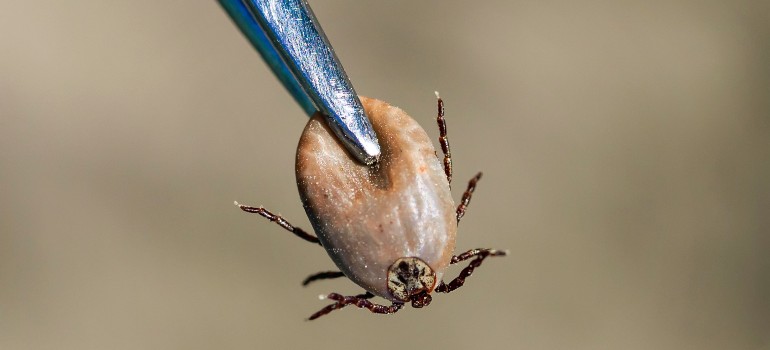





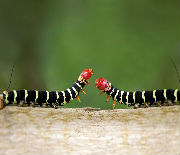
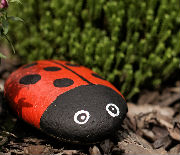
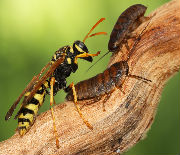
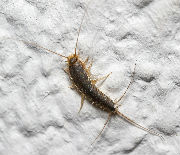
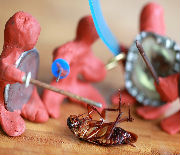
Leave a Reply